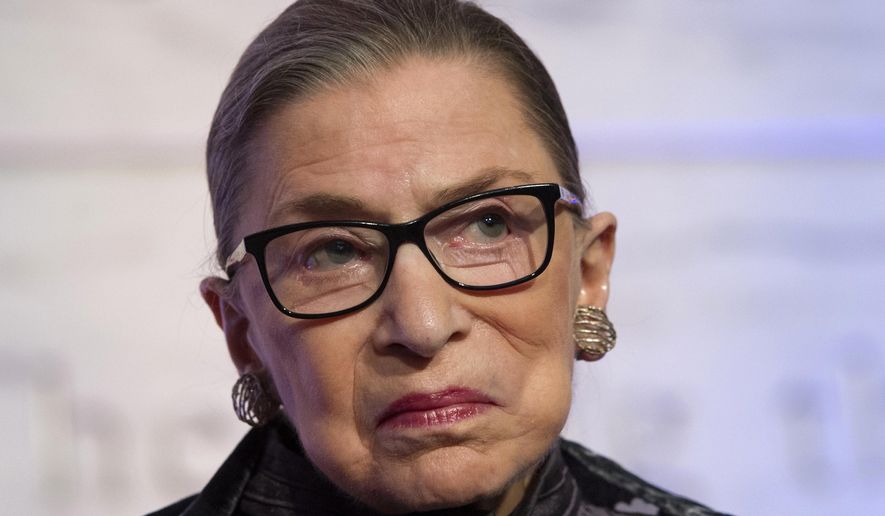Dozens of congressional Republicans are demanding that Justice Ruth Bader Ginsburg recuse herself from ruling on President Trump’s travel ban case before the Supreme Court hears arguments in October, saying she’s already shown she can’t be an impartial jurist when it comes to Mr. Trump.
Justice Ginsburg had to apologize during last year’s campaign for saying she worried for the country should Mr. Trump be elected, and accusing him of being “a faker.”
More than 50 House Republicans this week fired off a letter saying that creates a situation where her “impartiality might reasonably be questioned” — the standard laid out in law for a justice to drop out of a case.
“You are bound by law to recuse yourself from participation in this case,” said the Republicans, led by Rep. Ron DeSantis, Florida Republican.
None of the parties in the cases have officially asked her to step aside, and she took part in the decision issued this week, in which the court said it will take up broader arguments in October, but allowed a limited version of the travel ban to take effect in the meantime.
The court issued an unsigned per curiam opinion, so Justice Ginsburg didn’t reveal her personal leanings, but her participation signals she’s not likely to step aside.
“I would take that as a signal that she is not going to recuse,” said Michael Moreland, law professor at Villanova University.
The law says a justice “shall” recuse himself or herself if their impartiality might be questioned, but legal scholars said the final decision rests with the judges themselves — and they often err on the side of sitting.
Lumen Mulligan, associate dean at the University of Kansas School of Law, told The Washington Times that Supreme Court Justices often feel they have an obligation to hear a case because there’s only nine justices and a recusal would leave the court understaffed.
“This would be different if Justice Ginsburg was a trial court judge — easily replaced,” said Mr. Mulligan.
Ronald Rotunda, a law professor at Chapman University, said one of the rules for federal judges requires them to refrain from political activity and not publicly oppose or endorse a candidate, and he said Justice Ginsburg’s comments could be interpreted as an endorsement of one presidential candidate, Hillary Clinton, over the other, Mr. Trump.
“She means he’s nuts and so I’m for the other person,” said Mr. Rotunda. “The most natural interpretation would be that she should disqualify herself to avoid the appearance of impropriety.”
The Code of Conduct for Federal Judges doesn’t specifically bind the Supreme Court, but Chief Justice John G. Roberts, Jr., has said the court follows it.
Robert Tuttle, law professor at George Washington University, said Justice Ginsburg will consider whether she feels she can give the president’s policy a fair hearing.
“The real question is whether it effectively makes them incapable of judging the case independently and that’s something that really only they can say,” he said.
Recusal decisions can be controversial.
Legal experts pointed to the calls for the late Justice Antonin Scalia to recuse himself from a 2004 case involving then Vice President Dick Cheney because the two of them were hunting buddies. Scalia didn’t heed those calls.
“If that is a precedent, Justice Ginsburg’s comments, which don’t go nearly as far as going hunting with the person who is the named party, would seem to be less,” said Mr. Mulligan.
But Mr. Rotunda said Scalia did recuse himself from a case involving whether the words “under God” should be removed from the Pledge of Allegiance after he had made public comments on how he thought the lower court had wrongly decided that case.
• Alex Swoyer can be reached at aswoyer@washingtontimes.com.




Please read our comment policy before commenting.